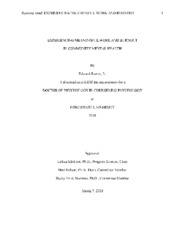Experiencing Meaningful Work and Burnout in Community Mental Health
Abstract
The purpose of this study was to examine community mental health staff, the depth to which they are experiencing their work as meaningful, and the level of burnout they are experiencing. Though research on burnout in community mental health is plentiful, existing research has not adequately addressed the role of experiencing meaningful work in community mental health. Thus, I examined whether or not meaningful work and burnout have an inverse relationship. This is one of the first studies to use the Work and Meaning Inventory (WAMI) and the Maslach Burnout Inventory-Human Services Survey (MBI-HSS) together. Participants were individuals currently working in community mental health. Once the data was retrieved, a backwards, stepwise multiple regression analysis was calculated to determine if there is a relationship between total meaningful work score from the WAMI and each of the subscales of the MBI- HSS. Results suggest a significant predictable relationship between work meaning, emotional exhaustion, depersonalization, and personal accomplishment.
Original item type
PDF
Original extent
101 pages
Collections
Copyright
This original work is protected by copyright. Copyright is retained by the author(s). Works may be viewed, downloaded, or printed, but not reproduced or distributed without author(s) permission.


 Maintained by the Northwest University Library
Maintained by the Northwest University Library